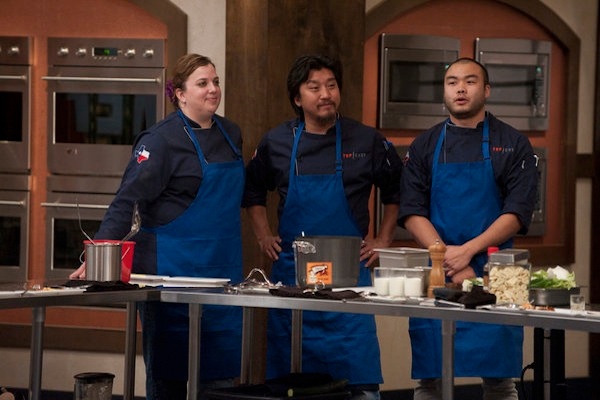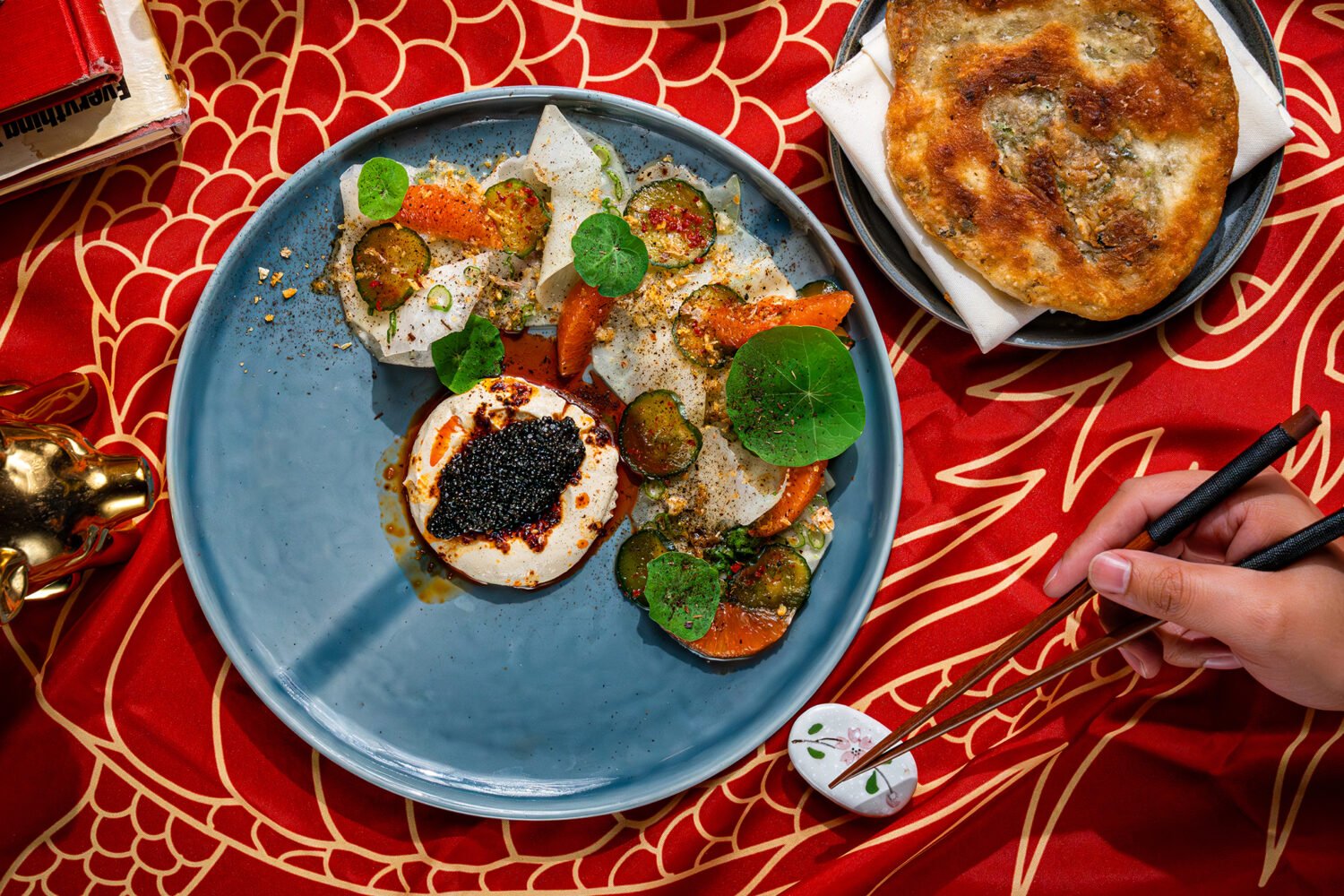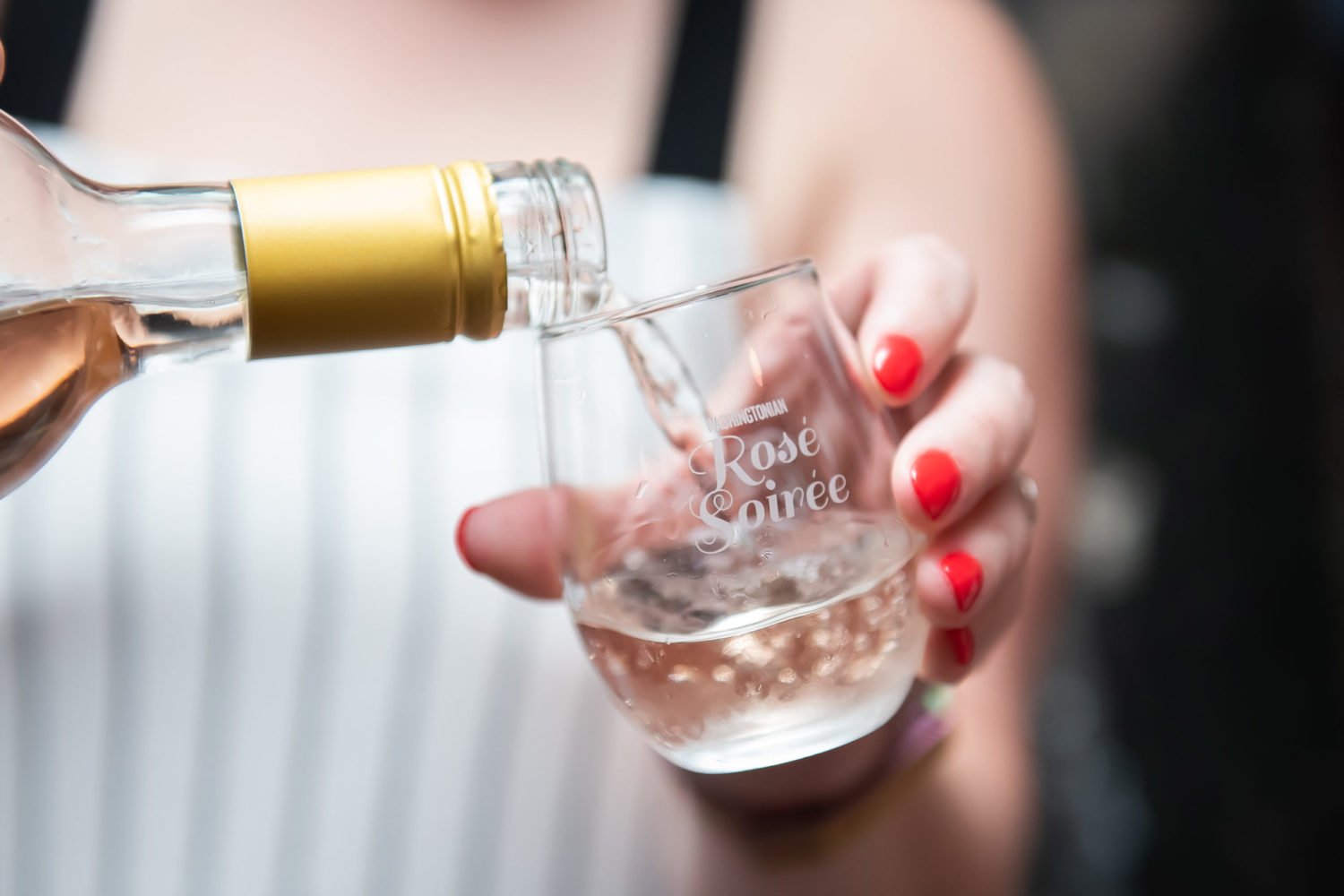Ed Lee, flanked by fellow cheftestants Heather Terhune and Paul Qui. Photograph courtesy of Virginia Sherwood/Bravo.
Top Chef: Texas fans, take note: Season 9 finalists Edward Lee and local son Paul Qui (from Springfield, Virginia) are going to be in town on March 31 for a cooking demo, lunch, and Q&A at Asia Nine, so get your tickets early. If you miss the class, you might catch Lee dining at Volt or tasting through a meal at Minibar—two spots he says he’d like to hit during the visit.
We recently checked in with the Louisville, Kentucky-based chef, who has spent this season whipping up rattlesnake for Padma, barbecuing for Modernist Cuisine author Nathan Myhrvold, and creating gore-inspired treats for the Evil Queen herself, Charlize Theron. With only five toques left, the pressure is on, and we won’t know until tomorrow night whether Lee makes it to the final four. Below, the chef spills his thoughts on the toughest challenges, what he’d change about the season, and his upcoming projects.
So what have been some of your favorite challenges so far?
My favorite challenges were the ones I did well in! The one with Charlize Theron is definitely up there, and I think the other chefs would agree. It was challenging, but there was a lot of freedom. As chefs, that gets our juices flowing.
How about the least favorite?
The chili challenge. It’s hard because it’s such a mundane, everyday food, but it’s also a very complicated dish that takes a long time to do. So it was really frustrating because you can’t do a gourmet touch on it or you’d lose the essence of what chili is. You have to keep the identity of it, so you’re up there 12, 15 hours cooking chili, wondering, “What can I do to make this thing better?”
How do you feel about being on the bottom in the last elimination challenge?
Cringing on the bottom is not fun. But the challenges are what they are. It’s pretty consistent throughout: Whenever I’m doing some kind of group challenge or team thing I’m always riding that line, and I do much better when it’s an individual challenge. Team challenges are really tough, because they’re very delicate; even though you’re cooking against each other, it’s still a team thing. And as chefs, we’re so used to being individual and independent spirits, and all of a sudden you have to go through something together. None of us are really used to that.
It must be hard as a chef-owner, too, because you probably get to dictate a lot of what goes on in your restaurant.
Yeah, and I’m also a little older than some of the other chefs. I’m more curmudgeonly and set in my ways. It’s hard to bend me at this point.
If you could go back and redo that challenge, what would you do differently?
I’d make food that actually tastes good! Reliving it now, you’re like, “Why did I even think about doing that?” You’re constantly slapping yourself on the head. And it’s very surreal, because I don’t even remember the thought process that got me to that dish. I used to be the Monday morning quarterback when I’d watch other seasons, being like, “God, what are these idiots thinking about?” And now I’m that idiot, going, “Oh, yeah, that’s what.” The pressure is so intense that your thoughts can go places they ordinarily wouldn’t.
If your role were reversed with the judges and you could design a Quickfire challenge for them, what would it be?
I’d have them make a dish that if I were a culinary student and they were the culinary masters (which they are) would make me want to take their class.
Who do you think would win?
Probably Tom [Colicchio].
So who are your top three competitors, in terms of talent, skills set, and the challenge they pose to you?
At this point in the competition, when there are six of us, everyone is so strong, and anyone can go home. Sarah’s very strong, Lindsay is incredibly strong and has very good classic training. Grayson is unpredictable, but when she brings it, she’s so good, she can clear out the whole pack any time. From here on out, it’s all relative to the challenge.
Between the time you knew you were going to be on Top Chef and when it began taping, what did you do to train?
Mostly I watched past seasons. I don’t think there’s anything you can do in your kitchen to prepare for something like this. I never guessed they were going to give us rattlesnake for the Quickfire. I kinda did guess that yeah, we’ll do something Texas-related, but with the parameters there’s no way to prepare culinarily. You just have to trust your instincts and allow that to shine.
So what’s up next for you post-Top Chef ?
We’re definitely opening another restaurant here in Louisville, and I’m working on a cookbook. We’re testing recipes for it right now. Hopefully by spring 2013 you’ll see it out in bookstores.
What’s the concept?
The cookbook will lay out my story. I grew up in Brooklyn as a child of Korean immigrants, and I followed this weird path from Brooklyn to being a literature major and wound up in Kentucky, of all places. When I got here seven years ago I was a fish out of water, and now I’ve embraced the South and the South has embraced me, and I’ve become this sort of adopted son of the region. I’ve never felt more at home in a place. I’m going to explain the whole story, which traces my Korean background to my version of Southern food. And it’s all geared toward the home chef. What’s the use of a cookbook if you can’t make the food in it?
Has your newfound fame changed the clientele in your restaurant? Any wacky fan encounters?
I don’t think any of us went into this innocently. Most of it’s good, though everyone once in a while you get a crazy person out there saying negative things. But none of it’s too bad. I have to come out of the dining room more often, to take pictures and sign menus, and I’ve never had to before. For me, it’s part of the job. We all went into this understanding that this is a very popular program, and none of it came as unexpected, but as much as you do plan for it, it’s strange to be walking in a mall and have someone yell your name from 50 yards away.
What do you do when that happens?
I just try and be as gracious as possible. It’s probably harder for my wife to deal with than me, just because a lot of young girls watch the show. So she’s been, you know . . . [laughs].
Do you think people come in with higher expectations?
I wouldn’t say higher, but very different. A year ago I’d come out to the dining room once to say hi to a regular, and now I find myself having to come out five, six times a night. We had a single mom and her son come in about three weeks ago. He was five and celebrating his birthday, and apparently all he wanted for his birthday was to come to my restaurant and meet me. I almost cried. He was so dressed up and so well behaved. He’d made an onion soup for me, and brought it in a Dixie cup. I took him back and showed him the kitchen, and he went, “Which one is the sous chef?”
You mentioned new challenges. If you could single it out, what do you think is the toughest thing about this whole competition?
For me, the toughest thing is watching myself on television and reliving the process. I’m like, “Argh, my hair looks like a mess, I look like a lazy bum.” So all your insecurities that you’ve ever had in life come out every Wednesday night.



















